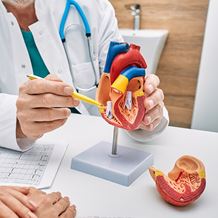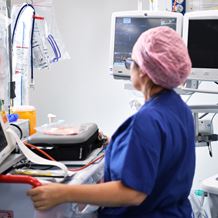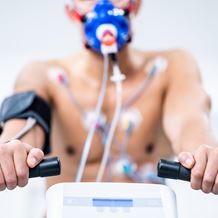
- Home
- Services
- Cardiac Services
- Procedures and Treatments
- Implantable Defibrillator (ICD)
What is an implantable defibrillator?
An implantable defibrillator, sometimes referred to as an ICD (implantable cardioverter defibrillator) is a small device that is connected to the heart. It uses electrical impulses to treat patients with abnormal heart rhythms. The ICD sits under the skin of your chest where it detects and prevents irregular heartbeats (arrhythmias), and delivers electric shocks as needed to promote a normal rhythm. It is also capable of recording and storing information about your heart for your doctor to review. It is typically used for patients with a dangerously fast heartbeat called ventricular tachycardia, or ventricular fibrillation.
What does it do?
ICDs treat abnormally fast heartbeats using pacing and defibrillation. It is capable of distinguishing between regular and irregular heart rhythms, and understanding when your heart is beating too fast. When it detects an abnormal rhythm, the ICD will wait briefly to see if it self-corrects. If the arrhythmia continues, the device sends out a set of electrical signals to slow the heart rate down. If that is unsuccessful, the ICD sends out an electric shock to restart a normal pattern. In the event that your heart is beating too slowly, the ICD also has a pacemaker function to correct the rhythm.
How does it work?
The implantable defibrillator works by continuously monitoring the heart to detect dangerous heart rhythms. A healthy heart has a regular heartbeat with a steady rhythm. If your heart rhythm beats too quickly or too slowly, this is a condition known as arrhythmia and it can occur as a result of aging, previous heart attacks or damage from heart disease. Left untreated, arrhythmias can be potentially life-threatening. If you are suffering from a type of arrhythmia, your doctor may recommend an implantable defibrillator to regulate your heartbeat, check for irregular patterns and deliver electrical impulses as needed. The device works by being placed under the skin, with thin wires connecting directly to the heart. Your heart rhythm is monitored using electrodes, and electrical currents are applied as appropriate.
Why is it performed?
ICDs are usually recommended for patients at risk of an unusually fast heart rhythm (arrhythmia), including those who have experienced symptoms such as palpitations, dizziness, or cardiac arrest. This includes:
- Patients that have experienced at least one episode of a fast or irregular heart rate.
- Patients who have previously suffered cardiac arrest.
- Patients with arrhythmia who have not benefitted from other treatment pathways.
Procedure
An anaesthetic is administered to numb the area and patients are given some medication to help with relaxation. An ECG machine will monitor the heart’s electrical activity throughout the procedure. An incision is made just below the collarbone to create a pocket of skin for the device to sit, while one or more electrode leads are guided through a vein towards the heart. An X-ray camera ensures that the device is well-placed and stable. The leads are connected back to the defibrillator device, and it is tested to make sure it is working appropriately. The wound is closed and cleaned. Implanting the ICD usually takes between one-three hours.
Recovery
After the procedure has finished you will be taken to the recovery room for observation. Your arm will have a special dressing that must stay on for the next week, and your doctor will give you instructions on how to care for your wound including information on when it is safe to resume daily activities. Tight fitting clothing should be avoided for the first month along with any heavy lifting. Your discharge team will talk to you about how to live with your device, and about creating an action plan in the event that you receive an electric shock from your ICD.
What's next?
If you have been experiencing heart-related symptoms, book an appointment with our cardiac services specialist today.
Our specialists in Cardiac Services
View all specialists





